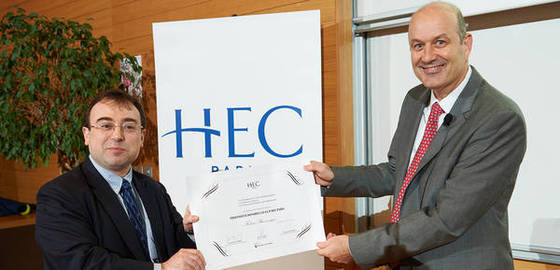"Academia can help you see things a different way", Federico Sturzenegger named HEC Honoris Causa Professor
On Wednesday 23rd March, Professor Federico Sturzenegger, President of the Central Bank of Argentina and Professor at Torcuato Di Tella University was awarded the title of HEC Professor Honoris Causa. The award followed his lecture to HEC Paris students on "Seeing the invisible: how academia can help you see things a different way".

Jacques Olivier, Dean of the Faculty and Research and Federico Sturzenegger, Honoris Causa Professor
Jacques Olivier, HEC Dean of Faculty and Research, introduced Federico Sturzenegger by stressing that the title of Professor Honoris Causa was granted to lecturers whose research has an impact both in academic circles and beyond: " We are very honored to welcome Federico Sturzenegger, who has been a visiting professor at HEC for many years and whose work on national income accounting and exchange rate regimes has had a significant impact on corporate and public policies,” he said. “HEC students have the unique opportunity of having a course on macroeconomics of crisis economies taught through the triple lenses of a top academic, bank CEO and policy-maker.”
Before receiving the award, the Argentine professor gave a lecture entitled referred to his own professional experience and research to explain how academia helped him to tackle some important decisions in his role as Governor of the Central Bank in Argentina. “The message I want to convey today is that academia provides a framework for thinking [about] the real world in a more provocative, challenging, and eventually, correct, way,” he said.
The professor explained this also allows us to look at the data and reality beyond the clichés that tend to dominate public debate. “This is what academia is about: the possibility of actually challenging your own thoughts on an issue, and to never stop challenging yourself. When you do that, you listen more, your learn more, and you do better policy. The exercise of academia prepares you for your own demise, prepares you to accept your own errors, and this, in turn, allows you to correct them sooner.”
Professor Sturzenegger then referred to a framework he created for some puzzles he confronted when analyzing two specific policy issues. The lecturer said he believed this was only possible thanks to his academic training, which guided academic and policy discussion in a dramatically different direction.
He concluded the lecture with words were on the role of values in shaping good policies.
Click here to read his lecture